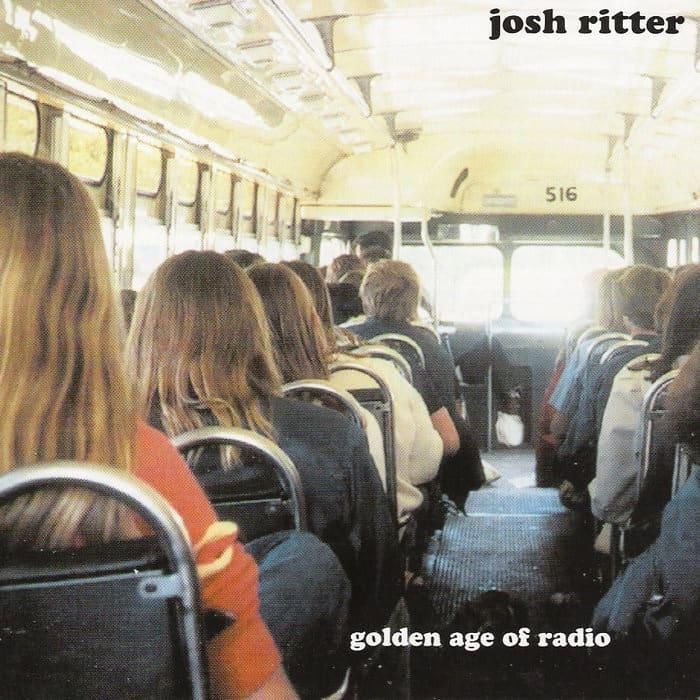The Golden Age of Radio by Josh Ritter (Review)

There were times in my youth that I remember — with half my tongue in cheek because I’m only 26 — being stuck hanging out with kids in garages, woods, and rural towns like Anthony Wayne, Ohio. I remember having to ask my parents to drive me to these towns. But I would have rather been hanging out with rich kids from Toledo’s nicer suburbs, going to parties with them, out to dinner with their families, swimming at the country club, or heading to the mall. Of course, I didn’t hang out with those kids much, although I tried so hard. But they picked on me for whatever reason, maybe because I simply didn’t fit in, and I in turn picked on other kids.
The kids I picked on were kids who didn’t have the good sense to wear the cool Guatemalan bracelets, the INXS t-shirts, the Polo cologne, or whatever might have been cool at the time. Sad but true, these very kids that I picked on ended up being my friends when times were hard. Sometimes for a school year, or a summer, or even just a weekend, and especially during times when I was particularly disliked by a particular person of influence for one reason or another. All I can say in my defense was that I got it out of my system when I was thirteen.
This all might seem like a diversion, but somewhere in here Josh Ritter reminds me of that shard of a real person I might have been when I wasn’t trying to be cool. When maybe, unbeknownst to myself, I did accept myself and the people who wanted to be around me when I was really lonely. I realize that before I got hungry, I was simply lonely. I remember stories of my own, hanging out with kids like Jason B. or Kurt O., or even Adam B.
It’s probably not too different from the story about Josh Ritter and his buddy Jiggs, two kids who maybe had only each other through the major emotional growing pains of adolescence in some barricaded nowhere shit-town. Of course, this was before he was a touring musician with a record deal, before he was confident with girls, and before the ugly duckling discovered that he wasn’t a duck at all. There’s Josh and Jiggs drinking beer (probably warm Old Milwaukee from the garage of Jiggs’ dad) beneath the stars, that one eternal backdrop. Kind of like Bob Dylan and Danny Lopez walking the hills of old Duluth.
When Ritter sings about those days, it makes me wonder if I knew that mine were good in the first place. Maybe I didn’t know I was having that feeling, but I was. It was smoking a cigarette in the baseball dugout before school (no wonder I didn’t make the team). Or going with a couple of guys at 6:00 on a Saturday night to see a girl I didn’t know and end up sitting on her parents’ couch watching TV, nobody saying a word or looking at each other. It was a time when seeing pretty Callie and Heather smoke their first cigarette, a Salem no less, on the street of a sub-division that Friday night seemed absolutely electric as I circled them on my bike.
For Ritter and his buddy Jiggs, it’s probably a memory of playing Towns Van Zant songs (and probably early Springsteen songs) on a screened-in porch. It was the time they painted their names on the Moscow, Idaho water tower. Probably over some other kids’ name who came before them. My town was just as insignificant, though my Americana was strip malls and watching “Diff’rent Strokes” with my sister.
For Ritter, Americana might have been some of the images that crop up in his songbook: heaven disguised as a pair of train tracks; hills naked from the horizon down; a man whose wings are made of hay and cornhusks; the ghost of Patsy Cline; the Northwest Passage and the Great Divide (this land might have been made for you and me…). But he also says, “you’ve got the moon.” And I always did. I still do, and probably always will connect to that great mystery, that great soothing, magnetic beauty. It is so simple, but so right. Not being afraid to go for the big question.
Now I’ve lived in the big city for four years. But sometimes I see someone or something that takes me back. Like a woman I saw in a restaurant yesterday in Boston. I recognized her secretly as a girl that moved to my town and came to my school in the second grade. We never talked then. She had a large burn scar on her face as a child. It was nearly gone now, and she was so tall. What’s more, her family actually lived around the corner from mine. I even went to her house once when I was twelve, one summer night with some other kids. Well, the other night, I had to wait on her and her boyfriend, as it turns out. I didn’t even say “Hi.” Not out of meanness, but out of fear. I wonder if she recognized me? I pretended I was nobody. I wonder how I could be like this? What kind of a world do I live in?
Somewhere in the ether of the legend of some spring day, Nick Drake wonders if Bridget St. John is coming by to visit. Elsewhere, Billy Bragg and Shirley really are talking on the fire escape. Dean Wareham wonders what the hell he’s doing at Harvard. Josh Ritter and Jiggs sit on the steps of the Junior High with a stack of “Spider-man” comic books and a pack of Dorals.
Written by Jonathan Donaldson.